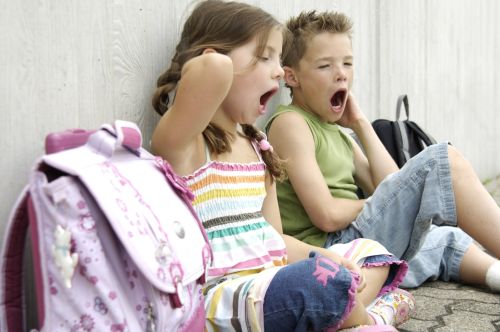Why do we yawn? Is yawning spread?
Not only do we have yawning behavior, but in most vertebrates, yawns. It can be mentioned as a penguin yawning when preparing to mate, yawning yawning to express anger, and solid yawning to adjust your jaws after eating prey.
The animals all have reason for their yawning behavior. So, what is the reason for yawning? And yawning has "spread"?
Explain yawning behavior in humans

You will be surprised to learn that people start yawning in their womb, particularly around the 6th month of pregnancy.
The real reason for this behavior is still causing headaches for scientists, but recent research may be related to brain development.
Accordingly, yawning will make the brain "cool down". The exhaustion and lack of sleep make the brain's temperature rise. At this point, we need to reduce the brain temperature by yawning. This is why when we are tired, boredom yawns a lot.
When yawning, our jaw muscles will create a pressure that makes blood rush to the brain more. Therefore, cool air from the outside is also sucked into the body by deep breathing behavior, which reduces the temperature in the brain faster.
According to an experiment, if a hot pack is heated on the volunteers' heads, they will yawn 41% more than 9% of those who have ice packs placed on their heads.

Does yawning "spread"?
The answer is yes. Scientists believe that yawning spread from person to person is a sign of empathy. In particular, we are more likely to get yawned from people who are close, close to us than strangers. This act of yawning begins when people are 4 - 5 years old, this is the age when we begin to develop empathy and the ability to identify emotions.

Particularly in children with autism, the possibility of yawning from other people is unlikely. Due to the decline of "mirror neurons" or "copy neurons", they play a role in responding to things that are happening around them.
The phenomenon of yawning is not common in the animal world, since most animals are not as capable of empathy as humans (except chimpanzees). But dogs are capable of yawning when their owners yawn because they are able to sense things around higher than others.

Normally yawning is harmless but if you yawn too much it means you are too tired or it could be a sign of a heart attack or blood in and around the heart's main artery. When you see yawning accompanied by the feeling of something pressing on your chest that makes it hard for you to breathe, go to the hospital immediately.
You should read it
- ★ How to Avoid Boredom While Social Distancing
- ★ Parents need to know these things to protect them when chickenpox is coming into season
- ★ What is hemorrhoids? Is hemorrhoids contagious, is it dangerous?
- ★ Tips to block viruses from USB, how to prevent viruses from spreading from USB
- ★ Asia: 26 types of viruses are spreading strongly!